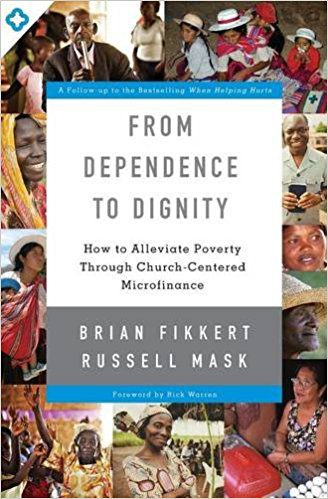"If you’re going to follow Jesus, you’d better love the poor (7).”
Rick Warren issued this powerful statement in his foreword to the book From Dependence to Dignity: How to Alleviate Poverty Through Church-Centered Microfinance, by authors Brian Fikkert and Russell Mask. Warren’s statement is true and biblically sound. Christ makes it clear in his Word that believers are to love the poor and defend the oppressed. We are to “take up the cause of the fatherless; plead the case of the widow (Isa. 1:17),” and serve “the least of these” (Mat. 24:40) in Jesus’ name. Just by looking at the number of religious nonprofits, global and domestic based out of the United States, it seems as though evangelical Americans are loving the poor. But the real question is, are they loving the poor well?
This is the purpose behind From Dependence to Dignity: to teach the global church howto serve the poor. At the beginning of chapter five, authors Fikkert and Mask address this very issue:
What is poverty? This is not just an academic question, for the way that we diagnose the problem of poverty determines the solutions that we use to alleviate poverty. If we get the diagnosis wrong or if we treat symptoms rather than underlying causes, we won’t help poor people get better. Indeed, we could even make their situation worse. We have to get the diagnosis right. Good intentions are not enough. (75)
Fikkert and Mask are not writing to encourage more giving and more funding for nonprofits. They are not asking their readers to continue to pour money into the endless cause of poverty relief. In fact, that is exactly the opposite of what they are proposing. In their own words, they are suggesting that ministries no longer “use relief when the context calls for development” (139).
In true teaching fashion, these two Covenant College professors manage to take a daunting topic with overwhelming academic research and make it more accessible to those of us for whom financial concepts don’t come as easily. For that, I applaud them. It was surely not a simple task to take all the information they have accumulated over years of research and hard work and translate it into three hundred pages of relatively readable material for the average layperson.
Though most of this book is an explanation of the “how” principles needed to develop microfinance ministry in the local church, the first portion lays a strong foundation for the “why” that exists in the need. In chapter two, “What is the Mission of the Church,” Fikkert and Mask argue in great detail for the need of contextualization in evangelism. The authors lay out three reasons why: “contextualization means communicating the eternal truth of the gospel in a way that is understandable, relevant, and attractive (31).”
Without preaching a false “health and wealth” gospel to their readers, Fikkert and Mask point out that, ultimately, poverty stems from creation’s broken relationship with its Creator. Because of this, our main focus as the church on mission should not be to simply meet the physical needs of the poor. However, by relating to those in need in a way that is understandable, relevant, and attractive, we are creating an avenue to fulfill the ultimate purpose of any ministry: to preach the good news of the gospel and see others restored to a right relationship with their Creator. Instead of allowing the academic research to take over as the main act, every outline, principle, and concept in the book revolved around this ultimate purpose of Christian ministry. Fikkert and Mask have managed to combine the academic and the spiritual by providing extensive research and clear principles for microfinance ministry, while also maintaining the ultimate truth, that Christ is the only One who heals the broken.
However, though this book is very helpful and will prove to be a good tool for the start-up of many microfinance ministries, I have some minor critiques with how the material was arranged. Until the introduction to part three, my critiques of this work were minor and mostly editorial. However, when I noticed the section header at the bottom of page 156, I was confused. There, in bold letters, was the question I had been asking for the first 155 pages: “What Exactly is Microfinance?” I was halfway through before I was offered a definition for the most-often used word in the book. In Fikkert and Mask’s defense, I am not a financial expert, so perhaps some level of understanding of microfinance is assumed in the first section. However, by their own admission in the preface, Fikkert and Mask specifically state their intentions for this book: “to help the global body of Christ understand both the possibilities and potential pitfalls of using microfinance as a ministry of the church (10).” They also write here that the “book is designed to be accessible to nonexperts (11).” They are explicitly writing to the local church. The layperson. The deacon. The missions committee member. The pastor and staff.
On page 198, the authors state the obvious:
“It is vital that those in a position of governance know enough about the basic principles of financial systems…. In particular, churches, missions, and ministries might have some learning to do about the principles of finance before they can allow their staff or members to establish microfinance systems.” (198)
If the authors’ primary concern is to instruct, inform, and enable the local church and parachurch organizations to create and sustain these microfinance ministries, and if the authors are writing with the assumption that there is indeed a learning curve to be overcome by their target audience, I might suggest those explanatory terms be included closer to the beginning.
In the preface, Fikkert and Mask lay out the basic outline of their work, explaining the purpose and order of each section. Part 1 begins by “exploring the unique challenges facing the global church in the twenty-first century (11).” The section ends with the fourth chapter, which “introduces readers to the field of microfinance in order to provide a context for the following sections (11).” However, it is not until part three that the reader is introduced to “the key terms and financial principles needed to understand microfinance (11).”
Because the material in this book is so important and because the authors present this material so well, I might suggest an out-of-order way of reading From Dependence to Dignity for future readers. I would begin with part two, which “explores the nature of poverty and its alleviation, arguing that most relief and development efforts are rooted in the materialism and rationalism of the Enlightenment worldview (11).” It is the basis for understanding the rest of the points made by the authors. Ultimately, one must understand the problem before one can be adequately equipped to confront it. I would then move to part three in order to learn about “the key terms and financial principles needed to understand microfinance (11).” This will help the non-expert establish some financial vocabulary about the development of complicated microfinance ministries and organizations.
Because the first section most closely relates to the last section, I would read it next. That way, as I finish reading about how “wealthy Christians [can] partner well with poor churches (11),” I can go straight into the final section, which “introduces and evaluates three possible models that churches and missionaries can use to pursue microfinance ministries (11).”
These are minor critiques, to be sure. Fikkert and Mask’s content was excellent. They deftly explained some difficult material and made complicated years of research and study applicable in the context of local church ministry. Too many Christians have an impoverished grasp of finance that could be improved by reading From Dependence to Dignity. Fikkert and Mask continue to serve the body of Christ well in this way. I would certainly recommend this book to any leader who is looking to establish a microfinance ministry within his own church or organization.
Elizabeth Brock
Elizabeth Brock in an intern for the Ethics and Religious Liberty Commission.










